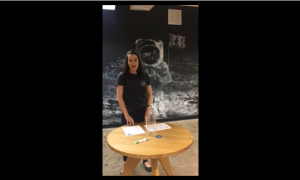比如Chuck第一次来中国,下飞机后,负责接待他的东北某大学英语系陈老师说:
您刚到,我们吃点饭吧。我们要点Chinese dumpling(饺子)和Chinese beancurd(豆腐),您看可以吗?
Chuck以前从未听说过这两种东西,但出于好奇,就说可以,结果饭菜端上来一看,原来就是ravioli(饺子,来自意大利语)和tofu(豆腐,来自日语)。Chuck当时心里暗想,这两种东西,国际上早已经有通用的说法(ravioli和tofu),他们中国人为什么还要用那种生僻的说法呢?
以后Chuck跟陈先生混熟了,就问他,当初你为什么不说ravioli和tofu呢?陈先生听了大吃一惊,连忙解释说,我真的不知道这两个词,而且我们的《英汉词典》上也没有这两个词。 于是Chuck开始意识到,中国的英语教师、英语课本、甚至英语词典肯定存在问题,否则不可能发生这种事情。
于是在中国五年的任教期间,Chuck收集了大量的Chinglish说法,从中挑选出一组最常见的,编写了上面提到的那篇长文。下面就是这些Chinglish说法:
(其中每行 ① 第一部分是汉语说法,②第二部分是Chinglish说法,③第三部分则是英语的标准说法)
① 欢迎你到... ② welcome you to ... ③ welcome to ...
① 永远记住你 ② remember you forever ③ always remember you(没有人能活到forever)
① 祝你有个... ② wish you have a ... ③ I wish you a ...
① 给你 ② give you ③ here you are
① 很喜欢... ② very like ... ③ like ... very much
① 黄头发 ② yellow hair ③ blond/blonde(西方人没有yellow hair的说法)
① 厕所 ② WC ③ men's room/women's room/restroom
① 真遗憾 ② it's a pity ③ that's too bad/it's a shame(it's a pity说法太老)
① 裤子 ② trousers ③ pants/slacks/jeans
① 修理 ② mend ③ fix/repair
① 入口 ② way in ③ entrance
① 出口 ② way out ③ exit(way out在口语中是crazy的意思)
① 勤奋 ② diligent ③ hardworking/studious/conscientious
① 应该 ② should ③ must/shall
① 火锅 ② chafing dish ③ hot pot
① 大厦 ② mansion ③ center/plaza
① 马马虎虎 ② so-so ③ average/fair/all right/not too bad/OK(西方人很少使用so-so)
① 好吃 ② delicious ③ good/nice/tasty/appetizing(delicious在中国被滥用)
① 尽我最大努力 ② try my best ③ try/strive(try的本意就是try my best)
① 有名 ② famous ③ well-known/renowned/legendary/popular(famous在中国被滥用)
① 滑稽 ② humorous ③ funny/witty/amusing/entertaining
① 欺骗 ② to cheat ③ to trick/to play a joke on/to con/to deceive/to rip off
① 车门 ② the door of the car ③ the car's door
① 怎么拼? ② how to spell? ③ how do you spell?
① 再见 ② bye-bye ③ bye/see you/see you later/later(bye-bye有些孩子气)
① 玩 ② play ③ go to/do(play在中国被滥用)
① 面条 ② noodles ③ pasta(noodles有些孩子气)
① 据说 ② it is said ③ I heard/I read/I was told
① 等等 ② and so on ③ etc. etcetera
① 直到现在 ② till now ③ recently/lately/thus far
① 农民 ② peasant ③ farmer
① 宣传 ② propaganda ③ information







